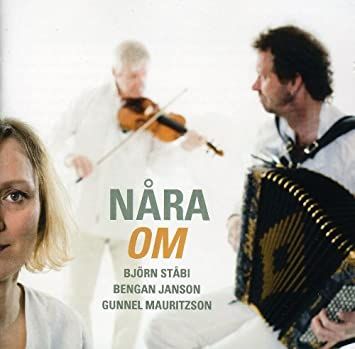I live in a state that saw a great influx of northern European immigrants in the 19th century. Today there are millions of people here who can trace their ancestry to Northern Europe, yet the concept of Nordic folk music is almost completely foreign to most of them. This is a real shame, because the genre produces some great music that is not only wonderful in and of itself, but also makes for a challenging listen to American ears.
While ABBA is Sweden's most recognizable musical export, the country is certainly not without a vibrant music scene and superstars of its own. Nåra, meaning "some" in Swedish, is something of a folk supergroup in their native land. Singer Gunnel Mauritzson is a renowned folk singer who also fronts her own band, GMB; Björn Ståbi is a master fiddler in his homeland; and Bengan Janson has played accordion with countless other Swedish musicians of note to that country's audience. This, the band's second effort, is heavy with traditional folk pieces with a few contemporary songs thrown into the mix.
"Mors vals," an instrumental, opens the album with its lilting melody that was written by a friend of the band for his mother's 60th birthday. While the song will not break any speed records, it is an uplifting tune with the fiddle and accordion playing harmony leads. After a dense wash of accordion sounding like a church organ, the great beauty of Mauritzson's voice really comes to the fore in "I himmelen," a pairing of two folk hymns. The title means "In heaven" and her voice is strong and soaring here. Another traditional piece, "Lasse Läilä Däu" is one of the highlights of the album. The accordion opens the song churning quietly in the background and finally bursts forth with a wonderful dance melody.
The second half of the album is just as strong, if not more so. "O store Gud" finds the band once again in the mood to get feet moving with a polska, a Nordic folk dance. This is followed by "Picka På Korken," a traditional song that was apparently a bit risque for its time. Here, the band rearranges it into a sprightly waltz. "Krogvisa" is a schottische and perhaps the most blatantly catchy tune on the whole album. The proceedings come to a close with another waltz, "Morfar Har Berättat."
While the sparse arrangements here ring thin at times, Gunnel Mauritzson's voice really opens up the songs and fills them in. The album manages to strike a good balance between slower, more somber pieces and those meant to get people's feet moving, which makes for an intriguing mix sure to please Nordic folk fans.

No comments:
Post a Comment